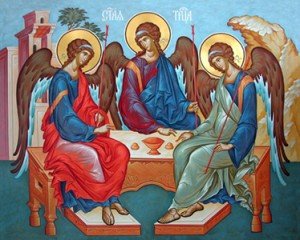 In the last installment of this article, I began sharing a brief introduction to the Fathers of the Church. If you have been reading my Bulletin, I know that you have repeated read my references to the Fathers of the Church. I’d like to share some information about who they are since they are the foundation of Tradition.
In the last installment of this article, I began sharing a brief introduction to the Fathers of the Church. If you have been reading my Bulletin, I know that you have repeated read my references to the Fathers of the Church. I’d like to share some information about who they are since they are the foundation of Tradition.
The idea of preserving and faithfully passing on the apostolic teachings concerning the meaning of Jesus is clearly evident in the era of the Trinitarian and Christological controversies. Bishops who faithfully preserved and protected the conciliar decisions of the key councils such as Nicaea (325), Constantinople (381) and Chalcedon (451) received the title “father”. The church considered these Christian leaders worthy of special honor and regard for preserving the true catholic and orthodox teaching during times marked by severe testing and also occasional persecution.
Vincent of Lerins describes the fathers of the church as people who “each in his own time and place” remained “in the unity of communion and the faith” and were “accepted as approved masters.” Vincent argues that “whatsoever these may be found to have held, with one mind and one consent, ought to be accounted the true and catholic doctrine of the Church, without any doubt or scruple.”
In addition, four key criteria are often employed to determine whether a particular Christian teacher qualifies as a father of the church. These are the four key criteria.
ANTIQUITY. A father lived and ministered from roughly the close of the first century (ca. 96) to the time of John of Damascus (750).
HOLINESS OF LIFE. Holiness we do not meant to mean perfection, as though the fathers were angels in human form. Most were intensely human and struggled with the same shortcomings and temptations common to humanity.
TRUE DOCTRINE. Since the fathers were true teachers of the church, two key points pertain here. First, a father must have left behind a body of teaching, however, small it might be. Second, this teaching must line up with apostolic tradition.
CHURCH APPROVAL.
The Church itself must identify and approve the teachings and lives of those who would receive the title Church Father. No one can claim the title for himself. Some highly significant early Christian writers failed to receive this title from the Church because of doubtful orthodoxy.
